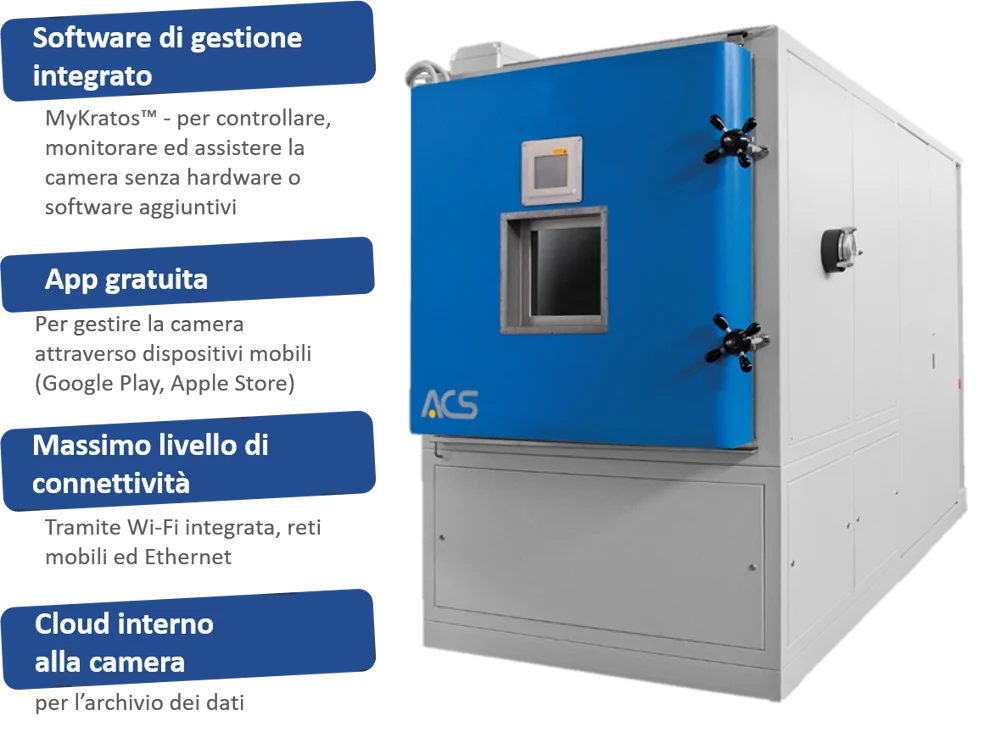
ACS altitude test chambers for aviation industry
How can you make sure that aeronautical materials and components function properly even at high altitudes?
Airplanes are designed to fly over land and water carrying people and goods, reaching very high altitudes and withstanding shocks and turbulence.
For this reason, the reliability of their components and materials is - literally - of vital importance! You need to make sure that any elements function properly at high altitudes and withstand sudden changes in pressure.
What are altitude test chambers for?
Altitude test chambers are required for testing components for the aviation market. They are used to reproduce the operating conditions of components or products that will operate at high altitudes, i.e. in environments where the atmospheric pressure level decreases over time.
As altitude increases, pressure decreases: with increasing altitude conditions, both the height of the air column above and the density of the air decrease.
To simulate the exact altitude above sea level, it is necessary to ensure effective combined control of temperature and pressure, and in some cases also humidity.
ACS solutions for altitude testing
To meet all testing needs, the range of ACS altitude chambers is available in both thermostatic (temperature and pressure control) and climatic (temperature, pressure and humidity control) versions.
Characterised by a very robust test room, the standard ACS chambers for altitude testing are available in 3 capacities: 150, 500 and 1000 litres.
The 500 and 1000 l models are also available in the ES version for environmental stress and are ideal for applications where a temperature change rate of 5°C per minute is required, while maintaining the same footprint and volume.
DISCOVER ACS STANDARD CHAMBERS FOR ALTITUDE TESTS
Highlights:
- Heated inspection window: a fully transparent double heating film allows the test compartment to be easily and clearly inspected and prevents condensation from forming on the glass.
- Self-levelling feet with excellent adherence and stability.
- Rounded corners allow better drainage of condensation drops and easy cleaning.
- A simple and reliable cooling plant ensures optimum thermodynamic performance at all temperatures.
- Optimized system for the thermoregulation of the walls of the test chamber in both the heating and cooling phase, even for pressures close to the minimum value (optional).
All altitude test chambers are equipped with remote control and remote assistance software
With MyKratosTM e MyAngel24TM you can remotely access the chamber to monitor and manage it anywhere and anytime, with the simple use of Wireless (WiFi), Ethernet or mobile network connections.
MAIN STANDARD
- DEF STAN 0035 3-11 (HIGH TEMPERATURES, LOW PRESSURES)
- DEF STAN 0035 3-12 (HIGH TEMPERATURES, LOW PRESSURES)
- DEF STAN 0035 3-13 (LOW TEMPERATURES AND PRESSURES, HIGH HUMIDITY)
- MIL-STD-810G METHOD 500.5 PART I
- MIL-STD-810G METHOD 500.5 PART II
- MIL-STD-810G METHOD 500.5 PART III
- RTCA/DO-160C
Do you need a customised altitude test solution?
Thanks to its wide experience and flexibility, ACS can design and manufacture special chambers for high vacuum tests, combined vibration tests, freezing tests, vacuum shock tests, according to customer specifications or standards such as MIL-STD 810 G and RTCA-DO-160.
FIND OUT AN EXAMPLE OF A CUSTOMIZED CHAMBER FOR ALTITUDE TESTS
